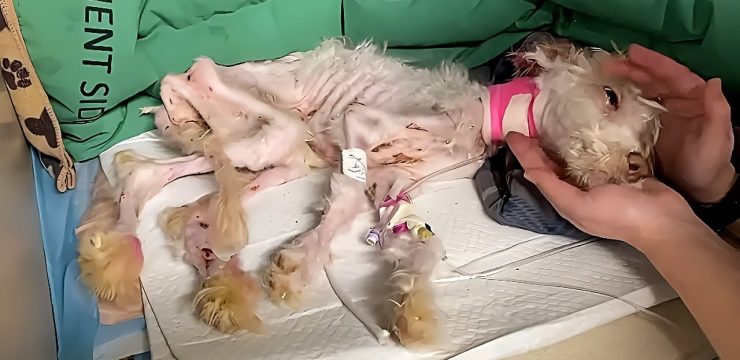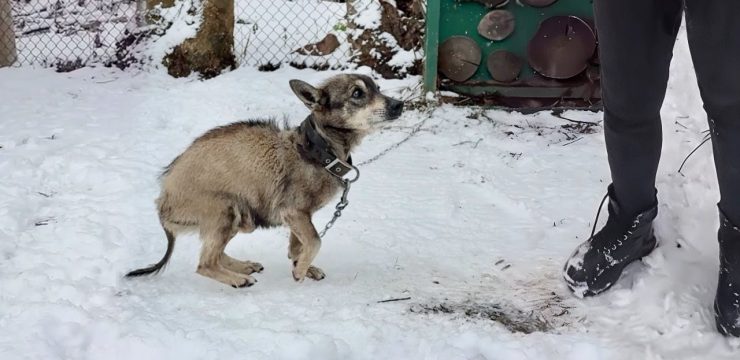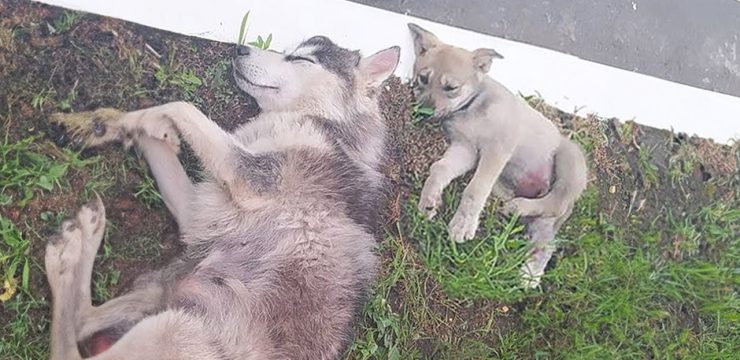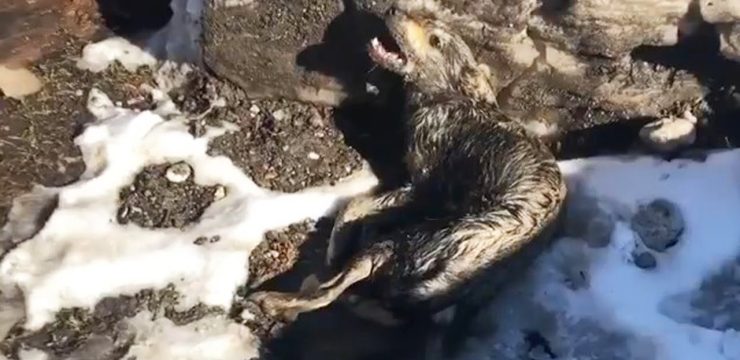The story begins with a quiet phone call that changed everything. An animal rescue team in Aruba received an urgent tip: a mother dog was tied to a tree and in desperate need of help. At first, it sounded like so many other distress calls they had answered before. But when the rescuers arrived, what they discovered left them shaken to the core. There, beneath the shade of a tree, stood a frail and exhausted mama dog. She was painfully thin, her ribs visible beneath her coat, and she was trapped by a cruel tangle of ropes and a heavy, rusted chain. The chain had dug so deeply into her neck over time that it left her swollen and struggling to breathe. It was a heartbreaking sight that spoke volumes about neglect and suffering.
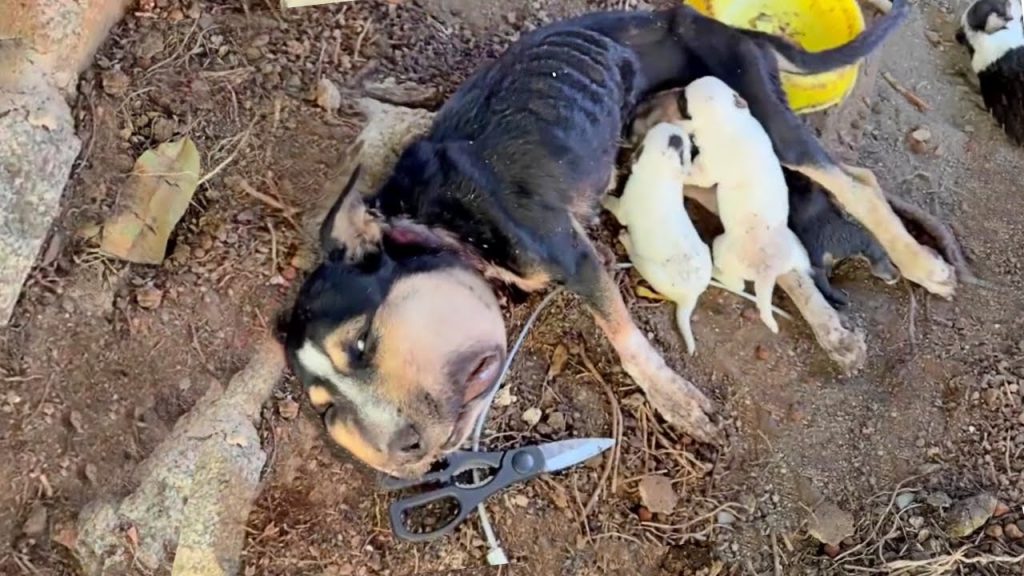
The rescuers moved quickly but carefully, their hands trembling as they worked to cut away the ropes and free the chain that had caused her so much pain. Every movement had to be precise, as the embedded metal had restricted her blood flow and left her severely injured. When at last the final piece of chain fell away, the dog staggered weakly, unable to hold herself up for more than a moment. The rescuers named her Khaleesi, meaning “Warrior,” because even in her fragile state, she had shown a will to survive. Beside her were her newborn puppies—tiny, only about ten days old—pressing close to their exhausted mother in search of warmth and milk. The image of this struggling family painted a vivid picture of resilience in the face of hardship.
Khaleesi and her puppies were rushed to a veterinary clinic without delay. The rescue team knew the odds were against them, but they also knew that this little family deserved every chance to fight for their lives. At the clinic, the medical team began emergency treatment. The pressure wounds around Khaleesi’s neck were cleaned and carefully tended to, fluids were administered, and she was given pain relief to ease her suffering. She was too weak to feed her litter, so her puppies were placed with a skilled foster volunteer who immediately began bottle-feeding them, waking every few hours to ensure the fragile babies were cared for. The dedication and compassion surrounding this family showed the very best of human kindness in contrast to the cruelty they had endured.
For a brief and hopeful moment, it seemed that Khaleesi might defy the odds. She survived her first night at the clinic, a small victory that filled her caregivers with cautious optimism. She even managed to eat a little food and take a few wobbly steps, as though she was determined to show her rescuers that she understood their efforts. Her eyes, tired but gentle, carried both gratitude and a deep weariness. Everyone who met her was touched by her spirit, and hope began to flicker in the hearts of those who had worked so hard to save her.
Yet, as the days passed, it became clear that Khaleesi’s body had endured too much. The prolonged trauma, combined with infection and exhaustion, overwhelmed her fragile system. Despite the tireless care she received, her strength began to fade. Only three days after her rescue, Khaleesi passed away peacefully. The news brought waves of sorrow to everyone involved—rescuers, veterinarians, foster caregivers, and countless supporters who had followed her story with hope. She had fought bravely, but her suffering had left scars too deep to overcome.
Although her life was tragically cut short, Khaleesi’s story did not end there. In fact, it became the spark that ignited something far larger than one rescue. Her story spread quickly across Aruba, touching not only locals but also tourists who happened to be on the island at the time. People who had never met her felt compelled to act. The image of this gentle mother, chained and suffering yet still nurturing her puppies, resonated deeply with the community. It was a wake-up call, a reminder of the urgent need for stronger protections and compassion toward animals.

The response was unlike anything the rescue team had ever seen. In the days following her passing, hundreds of people gathered for a silent march in her honor. Dressed in white, they walked together through the streets—residents and visitors side by side—each step symbolizing a commitment to end neglect and abuse. The atmosphere was somber but powerful. Though no words were spoken, the message was clear: Khaleesi’s life mattered, and her suffering would not be forgotten. Her memory had become a banner under which the community could unite, demanding change for the animals who could not speak for themselves.
That march became more than just a tribute; it became a turning point. Discussions began about new initiatives, stronger animal welfare laws, and community programs to prevent similar tragedies. Schools and local groups started conversations about kindness, responsibility, and the importance of treating animals with respect. For many, Khaleesi’s story became a lesson in empathy, teaching that compassion must extend to every living creature. Even though her time on Earth was short, her impact reached far and wide, leaving behind a legacy of awareness and hope.
The story of Khaleesi reminds us all of a profound truth: one act of cruelty can cause unimaginable suffering, but one act of kindness can inspire an entire community to rise together. She may not have survived her ordeal, but through her, countless other animals may one day be spared from similar pain. Her puppies, raised by a loving foster, symbolize the continuation of her spirit and the hope for brighter days ahead. In every wag of their tails and every step they take, there is a piece of Khaleesi’s courage and resilience.
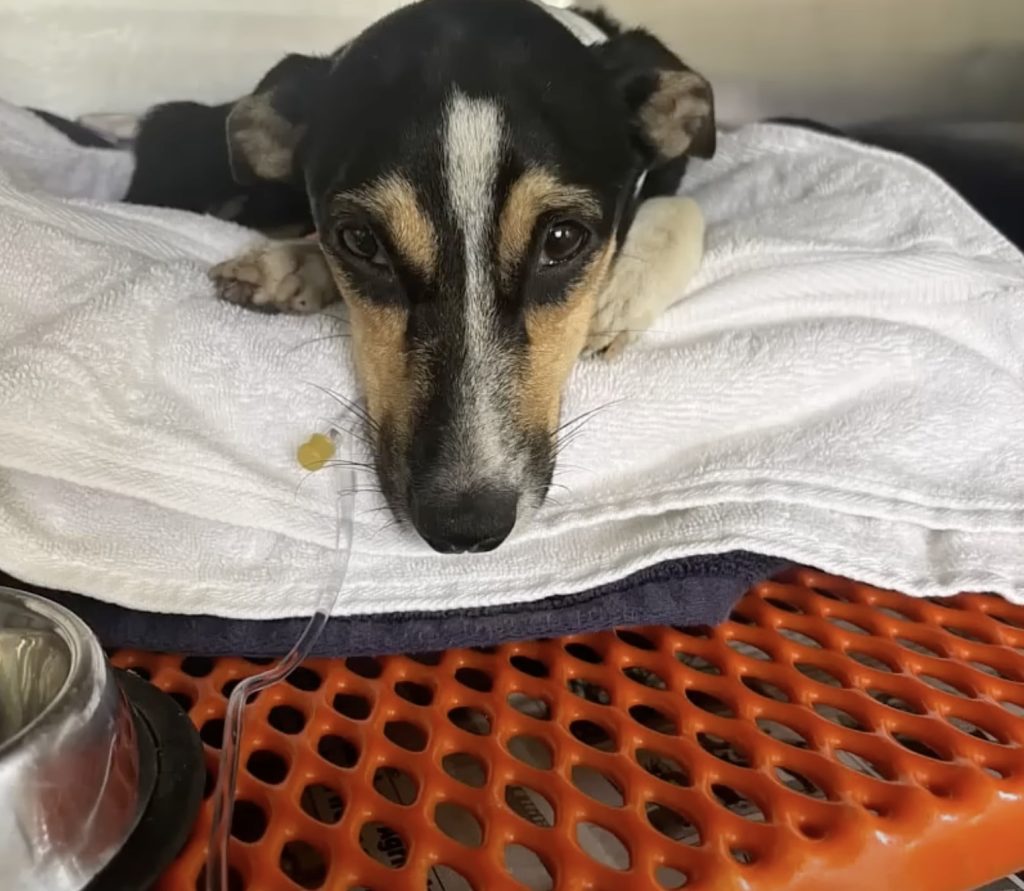
In the end, Khaleesi’s story is not only about loss but also about transformation. It is about the way a single life—no matter how humble—can touch hearts, spark action, and lead to change. Her journey from suffering to remembrance has left a mark that will endure, reminding us that compassion is a choice we can make every day. By honoring her, we honor all animals who deserve safety, dignity, and love. And by telling her story, we keep alive the flame of empathy she ignited, ensuring that her sacrifice was not in vain.

